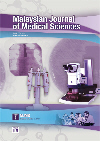
|
Malaysian Journal of Medical Sciences
School of Medical Sciences, Universiti Sains Malaysia
ISSN: 1394-195X
Vol. 14, Num. 1, 2007, pp. 65-66
|
![]() Malaysian Journal of Medical Sciences, Vol. 14, No. 1, Jan 2007,
pp. 65-66 Malaysian Journal of Medical Sciences, Vol. 14, No. 1, Jan 2007,
pp. 65-66
CASE REPORT
ACUTE RENAL FAILURE AND HEPATITIS: A RARE MANIFESTATION
OF TYPHOID FEVER -A CASE REPORT
Wahinuddin Sulaiman, Gunavathy M & Dr Muhaini Othman
Department of Medicine,
School of Medical Sciences, Universiti Sains Malaysia,
16150 Kubang Kerian, Kelantan, Malaysia
Corresponding Author : Dr. Wahinuddin Sulaiman M.B.B.S (Malaya), M.Med (Internal Medicine)(USM) Department of Medicine, Hospital Taiping, Jalan Taming Sari 34000 Taiping, Perak, Malaysia, Malaysia Tel : 609+05-808 3333 Direct : 609+05-840 8025 Fax : 609+05-808 0930 E-mail : wahin@hotmail.com
Submitted-20-02-2004, Accepted-03-12-06
Code Number: mj07012
Hepatitis complicating typhoid fever has been previously reported widely. Occurrence of acute renal failure and hepatitis together is exremenly rare. A case report of complicated acute renal failure and hepatitis in a tyhoid patient is reported and discussed.
Keywords: Typhoid, renal failure, hepatitis.
Introduction
It is estimated that there are 16 million cases of typhoid fever worldwide every year and almost 80% of the cases and deaths are in Asia (1). In affluent countries, the great majority of cases are seen in returned travelers. In poorer countries, typhoid is associated particularly with culture, poor sanitation, crowding and population. It still remains a major public health problem in less developed part of the world. Typhoid fever is a systemic prolonged febrile illness caused by Salmonella typhi with a high rate of complications involving one or more major organs in the body (2-4). A case of typhoid fever complicated by acute renal failure and hepatitis is described. This patient presented with 2 weeks history of fever, elevated serum creatinine and transaminases. We are reporting 2 complications occurring in the same patient i.e. acute renal failure and hepatitis, possibly the first reported case in Malaysia (5).
Case Report
A 26-year old Sarawakian, presented with 2 weeks history of high grade fever, headache, generalized body ache, abdominal pain and diarrhea which started 10 days prior to admission. He was jaundiced and febrile (38.5 oC) with relative bradycardia but was not dehydrated. His spleen was enlarged but no hepatomegaly. Hemoglobin 14.8 g/dL (normal: 12 - 14), WBC 4.3 x 103 /uL (normal: 4 - 11 x 103). Platelet was low at 61,000 / uL ( normal: 150,000 - 450,000 ). His serum bilirubin 85 µmol/litre ( normal: 0 - 19 µmol/litre ), AST 180 IU/l (normal: 0 - 38 IU/l ), ALT 200 IU/l ( normal: 0 - 41 IU/l), serum creatinine 786 µmol/l ( normal: 62 - 106 µmol/l ) and blood urea 22.8 mmol/l ( normal: 1 - 5.7 mmol/l ). His urine analysis showed proteinuria and sediments containing white blood cells, red blood cell casts and granular casts. Viral Hepatitis screening (A,B and C) was negative. His blood and urine culture grew Salmonella typhi but stool culture was negative. The Widal test showed raised in T(O) and T (H) titres of 1 : 3200 and 1 : 6400 respectively. Dengue and leptospiral serology were negative. Ultrasonography of the kidney and liver were normal. He was started on intravenous Ceftriaxone 2 gm daily. His urine output remained good and his renal function gradually improved. The platelet counts normalized once the temperature settled after 3 days of antibiotic. Upon discharge, his transaminases were return to normal limits. His blood urea was 2.7 mmol/L and creatinine value was at 112 _mol/l. He was discharged well after completing a 10 day course of antibiotic.
Discussion
Geographically typhoid has been well known endemically affects most of the underdeveloped
countries of which poverty, basic amenities are still the major obstacle for
the health authorities to curb this disease. Nevertheless, certain areas in
Malaysia are still considered as endemic breeding ground for S. typhi.
Although mortality from typhoid disease may be insignificant, it may lead to a major catastrophe if this treatable disease continuously being ignored of its potential complications. S. typhi may affect all the major organs and systems such as the heart, gastrointestinal tract, pulmonary, renal, brain as well as marrow leads to various complications such as carditis, bleeding diasthesis, hepatitis, pneumonitis/ acute respiratory distress syndrome, renal impairment and neuropsychiatric disorders. Renal failure and hepatitis complicating typhoid fever may be as common as in other form of sepsis. However, the problem may not be addressed seriously or perhaps these complications are too rare to be considered. Our patient illustrates good example of how these reversible complications could occur although it’s not an uncommon features of typhoid fever. It is to develop awareness for any clinician when they encounter this treatable disease.
Reference
- Merican I. Typhoid fever: present and future. Med J Malaysia 1997;52(3):299-308.
- Jagadish K, Patwari AK, Sarin SK, Prakash C, Srivastava DK, Anand VK. Hepatic manifestation in Typhoid Fever. Indian Pediatr 1994; 31(7): 807-811.
- Khosla SN, Singh R, Singh GP, Trehan VK. The spectrum of hepatic injury in enteric fever. Am J Gastroentrol 1988;83(4): 413-416.
- Ramanathan M. Unusual hepatic manifestations in typhoid fever. Singapore Med J 1991;32(5):335-337.
- Khan Mohammad, Coovadia Yaacob, Sturm AW. Typhoid Fever Complicated by Acute Renal Failure and Hepatitis : Case reports and review. Am J Gastroenterol 1998;93(6): 1001-1003.
© Copyright 2007 - Malaysian Journal of Medical Science
|
